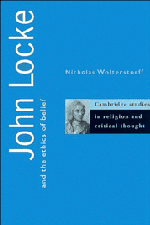4 - Locke and the making of modern philosophy
Published online by Cambridge University Press: 05 July 2011
Summary
Locke intended his epistemology as a solution to the crisis of the fracturing of the moral and religious tradition of Europe at the beginnings of modernity. That was not his only intent; but it was prominent. Furthermore, Locke, so I have suggested, was the first of those whom we now number among the great philosophers of early modernity to address himself to this crisis, certainly the first to offer the sort of proposal that he did. He described a new doxastic practice; and he argued that we are all obligated to apply this practice in all cases of maximal concernment – in particular, to matters of religion and morality. On its negative side, the practice represents the radical rejection of unverified tradition. On its positive side, the practice resembles the method which Descartes and his high medieval forebears had recommended for the practice of scientia – with this important revision, that probabilistic inferences be allowed in addition to deductive.
These conclusions, along with others which have turned up in the course of our discussion, invite a telling of the story of early modern philosophy quite different from that which has become traditional. I propose in this last chapter to point out where and why the main traditional story must be discarded, to indicate some of the outlines of an alternative, more accurate story, and to show how Locke fits into this alternative story.
- Type
- Chapter
- Information
- John Locke and the Ethics of Belief , pp. 227 - 246Publisher: Cambridge University PressPrint publication year: 1996



